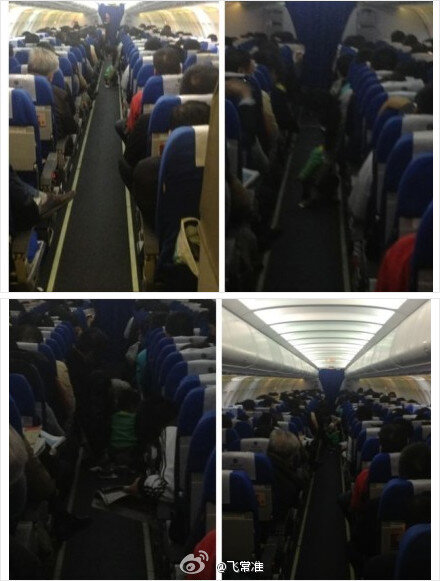Lanzimujin: When I went back home, I met my husband's nephew, a sophomore in high school. He hates school, but he loves history and geography. I chatted with him for a bit. He's quite a cute boy. He said he was brainwashed in elementary school to despise the U.S. and Japan and love Mao [Zedong]. In 2nd grade of middle school, he turned against his brainwashing. He said it would be much better if Xi [Jinping] was Chiang Ching-guo. He even calls himself a rightist. He knows about LXB [Liu Xiaobo]. He said his mother talks all day about the greatness of a certain party. He says his grandmother is an iron GF, and his cousin is a 50-Cent Party member who works for free. He's quite an angsty young person.
蓝紫木槿: 回老家,先生的侄子高二,厌学,但酷爱历史和地理。和他聊了一会,很可爱的一个小男孩。他说在小学时被洗脑,痛恨美日,无比热爱毛。初二时,反洗脑了。他 说习要是蒋经国就好了。还说自己是右派。他知道LXB。他说他妈妈整天就是某党好,说他外婆是铁板GF,说他堂姐是自费五毛。一个正苦恼着的少年。
Hainan-LiChao: The people of Harbin protesting the North Korean nuclear explosion…
海南-李超: 哈尔滨人民抗议朝鲜核爆……

Banner: (center, large text) Protest Against the North Korean Nuclear Explosion; Protect Our Home, People, Land, Water, Air, and Food
ZhangHuazhiV: If I can neither speak out nor sing, then discipline me as you will!
张华志V: 假使讲说话也不可,高歌也是过错,随便你处分我!

Image text: (center) Massacre: The CCP's "Greatness, Glory, Righteousness" fell from the hearts of the people.
BeijingChaoyangShibaliGuoguijun: Today we went to the Millennium Monument to call for the public disclosure of the assets of government officials
北京朝阳十八里店郭桂军: 今天去了世纪坛要求官员财产公示

Banner: (top) The Citizens Call For Public Disclosure of the Assets of Officials. (bottom) To sign: Send your "name + address + profession" to caichangongshi@gmail.com or send a text message to 15810050900
铮然02: 删贴 也阻挡不了民众的觉醒 保卫地球人类 是地球人的责任

Xuxin: Happy Lunar New Year to Big Xi [Xi Jinping]. By the way: When will the assets of government officials be made public?
徐昕: 向习大大拜年。顺便问下:官员财产何时公开?#让红包飞# http://t.cn/zYGDzWV

Tianjiliub: Thank you to the fans and volunteers for Bo [Xilai]. We have been together for 330 days! I've published over 26,000 weibos. Yesterday, Sina deleted [my account] TianjiliuA, and today, I'm back. Comrades, our iron will is forged with blood! Fight to the end! Fight to the death!
天际流b: 感谢粉丝们,挺薄的志愿者们,三百三十天,我们在一起!我发出了二万六千多篇微播,昨天,新浪删除了天际流A,今天我又回归了,同志们,我们用热血铸就我们钢铁般的意志!挺到底!誓死如归!

© Little Bluegill for China Digital Times (CDT), 2013
NBA Star Debuts on Chinese Social Media, Fans Clamor: #I want to speak to Kobe#
Bryant has been a beloved figure in China for years, and it is not surprising that his Weibo account has already amassed 200,000 followers since being opened just yesterday.
Many of China's younger, more educated Internet users can likely understand relatively straightforward English language tweets, but they may lack confidence to reach out in that language. A Kobe Bryant fan Weibo account called "Kobe's Home Weibo" (@科比之家微博), which has over 200,000 followers of its own, has volunteered to translate posts from Chinese into English to help netizens communicate with the NBA star.
Other American celebrities on Weibo often use English exclusively, or at least more than they do Chinese, so fans are not taking any chances, tagging their posts with the English-language hashtag #I want to speak to Kobe#. One wrote, "Finally, you set up your microblog account, I am so excited. The furthest distance in the world is not between you and me, but when you open a micro blog and I cannot speak English."
Time will tell how engaged Kobe chooses to become with his adoring online audience in China. Bryant has been tweeting from the official Nike Weibo account since February 9, and just hours ago issued his first tweet from his own account: "Valentine's day sneaks ready to break Clippers hearts. Big game tonight." That tweet alone, which accompanies an i! mage of Bryant with a pair of red sneakers, has already been shared over 25,000 times. If early response is any indication, he will have little trouble finding eager interlocutors in Chinese cyberspace.
















































































































